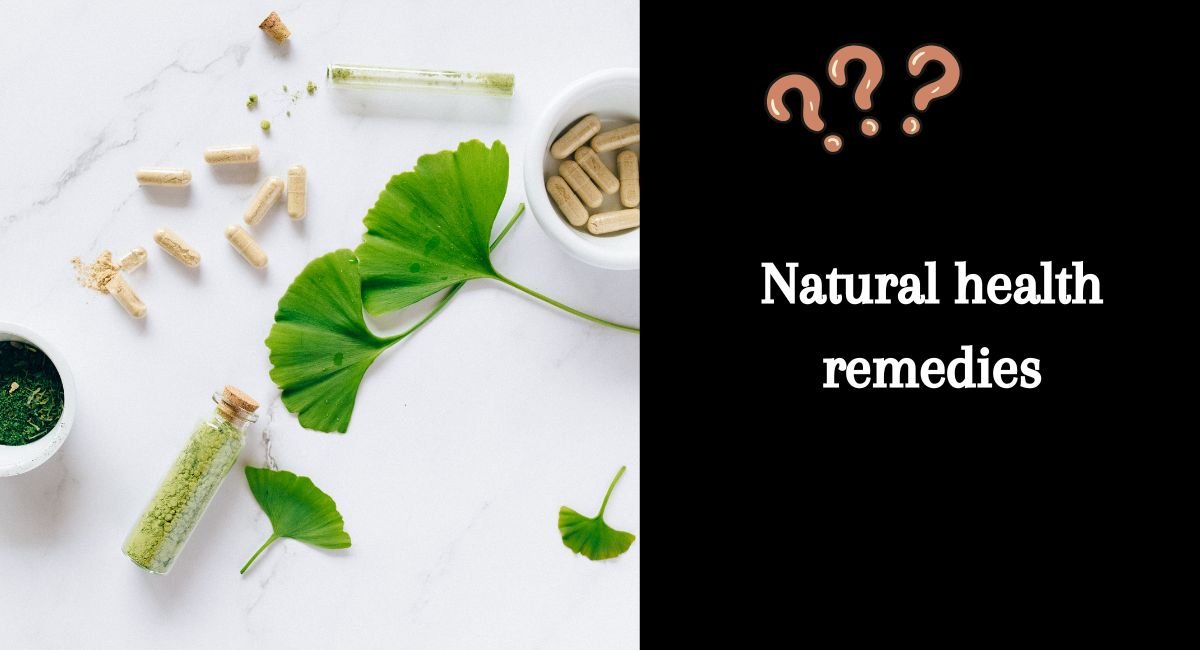Natural health remedies have become a go-to for many people who want to feel better without relying too much on medications. From soothing headaches to improving digestion or boosting energy, these remedies offer safe and effective alternatives. More and more individuals are turning to herbs, essential oils, mindfulness practices, and supplements to treat various health issues.
The idea is simple: use what nature provides to help heal the body and mind. In this post, we’ll look at some popular natural remedies that might help you feel your best. We’ll explore their benefits, how they work, and how to incorporate them into your daily life.
Table of Contents
Toggle1. Herbal Remedies: Simple Solutions from Nature
Herbal remedies are one of the oldest forms of healing. Plants have been used for centuries to treat everything from headaches to digestion issues. Today, many people still use herbs to feel better because they’re natural and easy to access.
A Few Popular Herbs and Their Uses:
- Ginger: Ginger is well-known for helping with nausea and digestive problems. It also has anti-inflammatory properties, which can be helpful for sore muscles or joint pain.
- Chamomile: Chamomile is great for relaxation. It’s often used to ease stress, calm anxiety, and improve sleep. A cup of chamomile tea before bed can help you wind down.
- Peppermint: Peppermint is another go-to herb for digestive health. It can help reduce bloating and indigestion, and even relieve headaches when used as an oil on the temples.
- Lavender: Lavender is famous for its calming effects. It’s used to reduce stress and anxiety, and its gentle scent can help you relax after a long day.
Herbs can be used in many ways. You can drink them as teas, apply them as oils, or even take them in supplement form. Just remember to check with a healthcare provider if you’re unsure about interactions with any medications you may be taking.
2. Essential Oils: A Little Scent Goes a Long Way
Essential oils are concentrated plant extracts. These oils can be inhaled or applied to the skin for a variety of health benefits, from boosting mood to relieving pain.
Some of the most popular essential oils for health include:
- Lavender Oil: It’s widely known for its ability to help reduce anxiety and improve sleep. Simply diffuse a few drops before bed or apply a diluted version to your skin.
- Peppermint Oil: This oil is great for headaches and muscle pain. You can apply it directly to the temples for relief or inhale the scent to clear your head.
- Eucalyptus Oil: If you’re feeling congested or have trouble breathing, eucalyptus can help. It’s often used in steam inhalation to clear the airways.
Essential oils are easy to use, but it’s important to apply them correctly. Always dilute oils before applying them to the skin, as they can be too strong in their pure form.
3. Supplements: Simple Additions for Better Health
Dietary supplements can be a simple way to support your body’s natural healing processes. While eating a balanced diet should be your main focus, some supplements may provide extra support for specific health concerns.
Here are some of the most popular natural supplements:
- Probiotics: These are good bacteria that help balance your gut microbiome. A healthy gut can improve digestion, boost immunity, and even support your mental health.
- Vitamin D: Many people don’t get enough Vitamin D, especially in colder months when sunlight is scarce. Taking a Vitamin D supplement can help improve mood, bone health, and overall immunity.
- Turmeric: Known for its anti-inflammatory properties, turmeric is often used to relieve joint pain and support heart health. You can take it as a supplement or use it in your cooking.
- Magnesium: Magnesium is essential for muscle and nerve function. It’s also known to help with sleep and reduce anxiety. Many people find it helpful to take before bed.
Before adding any supplement to your routine, it’s always a good idea to check with a healthcare provider to ensure it’s right for you.
4. Mind-Body Practices: Relaxation from Within
Natural remedies aren’t just about herbs and supplements. Mind-body practices, such as yoga, meditation, and deep breathing, also play a big role in improving your overall health. These practices help reduce stress, improve mental clarity, and support physical health.
Common Practices to Try:
- Yoga: Yoga can help you stretch, relax, and improve flexibility. It’s also great for calming your mind. Even a short session can reduce stress and help you feel more grounded.
- Meditation: Meditation is a simple practice where you focus on your breath or clear your mind. It’s been shown to help with anxiety, stress, and sleep problems.
- Breathing Exercises: Deep breathing exercises, like box breathing, can help calm the nervous system. Try using deep breathing when you feel overwhelmed or need to relax.
- Tai Chi: This is a form of moving meditation that involves slow, deliberate movements. It’s especially great for older adults or anyone looking to improve balance and reduce stress.
All of these mind-body practices are gentle and can be done at home. Just a few minutes each day can make a big difference.
5. Nutrition: What You Eat Matters for Your Health
Your diet plays a big role in how well you feel. Natural health remedies go hand in hand with good nutrition. Eating the right foods can help you feel more energetic, support your immune system, and prevent chronic diseases.
Some Key Nutritional Tips:
- Anti-Inflammatory Foods: Foods like leafy greens, berries, and fatty fish (like salmon) can help reduce inflammation in the body. Chronic inflammation is linked to many health problems, so focusing on anti-inflammatory foods is a great way to stay healthy.
- Gut-Friendly Foods: Eating more fiber-rich foods, like fruits, vegetables, and whole grains, supports a healthy gut. Fermented foods like yogurt, kimchi, and sauerkraut are also great for gut health.
- Drink Plenty of Water: Staying hydrated is essential for digestion, skin health, and energy levels. Try to drink at least 8 cups of water per day.
- Avoid Processed Foods: While it’s okay to indulge occasionally, processed foods high in sugar and unhealthy fats can contribute to inflammation and other health issues. Opt for whole, unprocessed foods as much as possible.
By focusing on a balanced, whole-food diet, you can support your body’s healing processes and complement other natural remedies.
6. Self-Care: A Natural Remedy for Stress
Sometimes, the best natural remedy is simply taking care of yourself. Self-care doesn’t have to be complicated or expensive—it’s about taking small steps to reduce stress and prioritize your well-being.
Here are some easy self-care ideas:
- Take a Walk: A simple walk outside can help clear your mind and reduce stress. Fresh air and light exercise work wonders for mental clarity and relaxation.
- Take a Bath: A warm bath with Epsom salts can help relax your muscles and calm your mind. You can also add a few drops of essential oils like lavender for added relaxation.
- Practice Gratitude: Taking a moment each day to reflect on what you’re grateful for can improve your mental health. It helps shift your focus away from stress and negativity.
- Get Enough Sleep: Sleep is crucial for overall health. If you’re not getting enough rest, it can impact your immune system, energy levels, and mental health.
These simple practices can make a big difference in how you feel day to day.
Conclusion: Natural Health Remedies for a Balanced Life
Natural health remedies are a powerful tool for improving your overall well-being. From herbal teas to essential oils, supplements, and mind-body practices, there are many ways to enhance your health naturally. The key is to find what works best for you and incorporate it into your daily routine.
Taking a holistic approach to health—focusing on physical, mental, and emotional well-being—can lead to a more balanced and vibrant life. While natural remedies can help, always remember that it’s important to consult with a healthcare provider, especially if you’re dealing with a serious health issue or taking prescription medications.
By embracing natural remedies, you can support your body’s natural ability to heal and thrive.
FAQ on Natural Health Remedies
1. Are natural remedies safe to use?
Natural remedies are generally safe, but it’s important to use them correctly. Some herbs and oils can interact with medications. Always check with your doctor before starting a new remedy.
2. How long does it take for natural remedies to work?
This depends on the remedy and the person. Some remedies provide immediate relief, while others might take time to show results. Patience is key with natural health.
3. Can I replace prescription medication with natural remedies?
Natural remedies can support health but should not replace prescription medication unless directed by your healthcare provider. Always discuss changes to your treatment plan with your doctor.
4. How do I use essential oils safely?
Essential oils should always be diluted before applying to the skin. Use a carrier oil like coconut oil to dilute them. Never ingest essential oils unless advised by a professional.
5. Where can I buy natural health remedies?
You can find herbs, essential oils, supplements, and other remedies at health food stores, online retailers, and some pharmacies. Be sure to buy from reputable brands to ensure quality.

